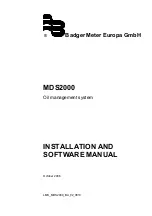
3
on to the relay portion of the valve. The emergency function
of the valve automatically applies full trailer reservoir air
pressure to the trailer chambers when the trailer supply
pressure falls below a predetermined minimum value.
The RE-6
™
/RE-6NC
™
relay emergency valve may be
fl ange or reservoir mounted. Ports are clearly identifi ed for
delivery, service, emergency (supply) and reservoir lines.
RE-6NC
™
VALVE DESCRIPTION
The RE-6NC
™
valve is a special non-charging relay
emergency valve. It is used on dollies to comply with
FMVSS 121. The RE-6NC
™
valve eliminates the need for
a protected reservoir to provide the release air for the trailer
spring brakes when the following requirements are met:
- The trailer supply line must be 70 psi minimum with any
leakage-type service system failure.
- The parking brake must not drag at trailer supply line
pressures above 70 psi.
The relay function of the RE-6NC
™
valve is identical to that
of the RE-6
™
valve, serving the dolly or trailer system as
a remote controlled brake valve. The emergency function
of the valve automatically applies full trailer reservoir air
pressure to the trailer or dolly chambers when the trailer
supply pressure falls below a predetermined minimum
value. The major difference between the RE-6
™
and the
RE-6NC
™
valve is that the RE-6NC
™
valve allows supply
pressure (initial charge) to release the spring brakes before
the dolly or trailer reservoir(s) is fi lled.
RE-6
™
& RE-6NC
™
VALVE SYSTEM
CONFIGURATION
In the RE-6
™
valve dolly system, the supply air fl ows to the RE-
6
™
valve, passes through the valve, holding the chambers in
the apply position while simultaneously fi lling the reservoir.
In the RE-6NC
™
valve dolly system, reservoir air is not
supplied through the RE-6NC
™
valve, as it is in the RE-6
™
valve system. The supply air fl ows to the RE-6NC
™
valve,
acts upon the emergency piston, pushing the emergency
piston toward the inlet / exhaust valve seat. System
pressure in the chambers and reservoir are still at 0 psi in the
RE-6NC
™
valve system, allowing for faster trailer pull-away.
In the RE-6NC
™
valve system, air is also fl owing to the
PR-3
™
valve, which will allow the air to fl ow on to the
reservoir at a pressure setting of about 70 psi. The major
difference between the RE-6
™
valve and the RE-6NC
™
valve is that the RE-6NC
™
valve does not require the
system to charge the reservoir to a predetermined psi
before drive away is allowed. Refer to Figure 3.
CHARGING THE RE-6
™
& RE-6NC
™
VALVES
BELOW 45 PSI
When the air brake system is charging below 45 psi,
emergency supply air enters the RE-6
™
and RE-6NC
™
valves emergency port. In the RE-6
™
valve the air acts on
the check valve and the emergency piston. In the RE-6NC
™
valve the air acts on the emergency piston, because there
is no check valve present. This allows for faster drive away
(reference FMVSS 121 regulation). In the RE-6
™
valve, the
supply air is forced past the check valve, fl owing through
the emergency piston shoulder and past the inlet / exhaust
valve. The air fl ows to the upper portion of the valve,
underneath the relay piston and out to the service brake
chambers while simultaneously fi lling the reservoir with the
same air that is passing through the emergency piston. In the
RE-6NC
™
valve, air is only acting upon the emergency
piston. The check valve is not present. In replacement
of the check valve, the RE-6NC
™
valve uses a reservoir
control valve (the Bendix
®
PR-3
™
valve), to allow the
reservoir to be fi lled. The PR-3
™
valve is totally separate
from the RE-6NC
™
valve, but is necessary for proper
operation of the RE-6NC
™
valve. Air acts on the PR-3
™
valve piston, but will not fl ow on to the reservoir until about
70 psi. Refer to Figure 4.
RE-6
™
Relay Valves
RE-6NC
™
Relay Valves
RESERVOIR
45 PSI
CHAMBERS
45 PSI
EMERGENCY
SUPPLY
45 PSI
0 PSI
0 PSI
45 PSI
FIGURE 4
RE-6
™
& RE-6NC
™
RELAY VALVES CHARGING
BELOW 45 PSI






























